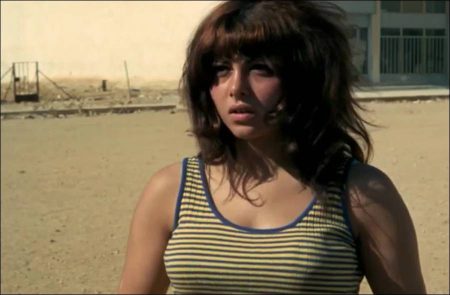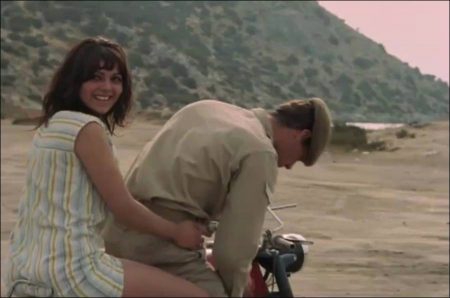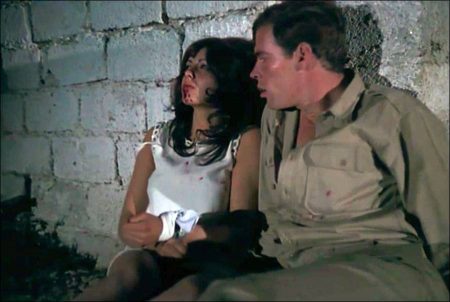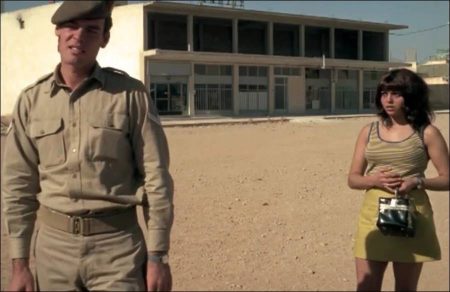Evdokia movie storyline. Athens, 1971. In the middle of the costly seven-year military junta, Yorgos Baskos, a young sergeant, stumbles upon the frisky and promiscuous Evdokia at a local tavern and is captivated by her exuberance and beauty. As a result, intoxicated by wine and his lust for her, Yorgos raises his cup and dances for her eyes only.
Unbeknownst to him that her lover is watching from afar with murderous intent. However, this unpleasant incident will mark the beginning of a tempestuous love affair defined by desire, fragile societal relations, and an ever-present internal conflict arising from lost dreams in a fleeting life. Will Yorgos and Evdokia ultimately survive one another?
Evdokia (Greek: Ευδοκία) is one of the most important works of Greek cinema. It is a drama of passion whose main characters are a sergeant and a prostitute (Evdokia) who get married after a brief passionate affair. Very soon, however, the influence of their environment strains their relationship, and the man tries to break away, but without success.
The pair is surrounded by harsh light, the rock, the bare landscapes and military exercises, on the one hand, and sensuality and constrictions, on the other. Because of her occupation, Evdokia both attracts and repels the sergeant. The petit bourgeois environment, the lumpen elements, the social fringes and petty interests stifle the young couple: they apparently want to rebel, but never succeed.
With everything moving among violent sensuality, cruelty, coarseness, and total austerity, this “prosaic” story assumes the dimensions of an ancient tragedy. The inner struggle of the protagonists, the conflict of desires and values, the straightforward narration, vigorous pace, immediacy and sound construction constitute one of the most important works of the Greek cinema. In Greece, the film is mostly known for the popular Zeibekiko instrumental piece “Zeibekiko of Evdokia”, written by Manos Loizos. In 1986, Evdokia was voted by the Greek Film Critics Association as the best Greek film of all time.

Film Review for Evdokia
If you’re Greek, I’m sure you know the infamous zeibekiko, written for the movie by Manos Loizos. But the rest of the movie remains hardly known to the big public. Since recently, it was impossible to get a copy from the movie. A newspaper gave it on DVD and so some of us were able to see it, finally. It was worth it.
Alexis Damianos, the director, has only directed three movies. His job in “Evdokia” is excellent. It’s realism, but with a great deal of naturalism. It’s a story of love, between a young prostitute and a soldier. Their relationship is based on sex -the erotic scenes are rather brutal- and the general spirit of the movie isn’t very pleasant.
The wild nature that surrounds the characters justifies the cause: It’s a hard life, and the thin line between love and death is hardly visible. The most memorable scene, after all, is the one of the excursion in the wild nature. The heroes play with death so easily, as if he didn’t matter. Remember: It’s the dictatorship-era in Greece (1967-1974).
You might be disappointed by the performances -she’s OK, he’s really awful, except from the one by K. Agagiotou -she plays an old prostitute. The sound dubbing is also notably bad. But, let’s be cool for a moment, it’s still the 70s, and this is a really low-budget effort. I think it’s at least a very good token of what Greek cinematography could have been, if the circumstances hadn’t been the same.
Evdokia (1971)
Directed by: Alexis Damianos
Starring: Maria Vassiliou, George Koutouzis, Koula Agagiotou, Christos Zorbas, Vassilis Panayiotopoulos, Paulos Roussos, Nasos Katakouzinos, Maria Koutokaki, Spyros Kyriakopoulos
Screenplay by: Alexis Damianos
Production Design by: Yiorgos Stamboulopoulos
Cinematography by: Christos Mangos
Film Editing by: Andreas Andreadakis, Matt McCarthy
Makeup Department: Julia Andreadi
Music by: Manos Loizos
MPAA Rating: None.
Distributed by: Katamor Productions, Poreia
Release Date: September 21, 1971
Views: 378



